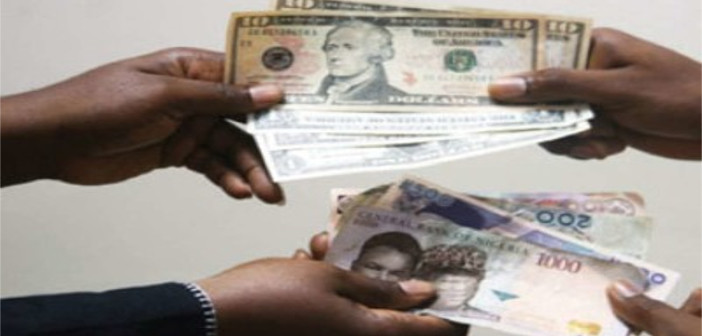Internal and external pressures on Nigeria to relax its current foreign exchange regime are mounting. No fewer than five European countries are known to have approached government officials in attempts to canvass a relaxation of foreign exchange rules so that goods from their countries can come into the country.
The Central Bank of Nigeria (CBN) is one of the agencies that are facing such pressure.
Some of the foreign governments, it was learnt, are unhappy that goods from their countries are among the 41 items the CBN had, last June, officially stopped the sale of dollars for in order to reduce pressure on the naira and conserve Nigeria’s external reserves.
The items are vegetable and processed vegetable products, poultry (chicken, eggs, turkey), private airplanes/jets, Indian incense, tinned fish in sauce (Geisha/Sardines), cold roiled steel sheet and galvanised steel, roofing sheets, wheel barrows, head pans, metal boxes and containers, enamelware, steel drums, steel pipes, wires, rods, wire mesh, steel nails, security and razor wire.
Others are wood particles boards and panels, wood fiber boards and panels, plywood boards and wooden doors, rice, cement, margarine, palm kernel/palm oil products/vegetable oil, meat and processed meat products, toothpicks, glass and glassware, kitchen utensils, tables, textiles, woven fabrics, clothes, plastic and rubber products, soap and cosmetic, tomatoes/tomato paste and Eurobond/foreign currency bond/share purchase.
The CBN had explained that though the items were not banned, their importers should bring them into the country using their own funds without recourse to the Nigerian forex market.
The Central Bank statement listing the items added: “In the continuing effort to sustain the stability of the forex market and ensure the efficient utilisation of forex and the derivation of optimum benefits from goods and service imported into the country, it has become imperative to exclude importers of some goods and services from accessing foreign exchange at the Nigerian foreign exchange market to encourage local production.
“The implementation of the policy will help conserve forex reserves as well as facilitate the resuscitation of domestic industries and improve employment generation.”
The Guardian learnt in Abuja that, apparently finding it difficult to convince the political wing of the government for a change of heart, ambassadors, who push the economic and other interests of their countries, are paying visits to certain regulatory agencies to ask for the relaxation of the new rules.
Experts insist that the argument of the foreign governments is not altruistic at all. “This is because they want a relaxed atmosphere so that Nigerians can continue to order imported items from them. This will deplete our already low foreign reserves,” one expert insisted.
A top government official disclosed that unable to bend government to its whim, the agents of the foreign governments have resorted to employing underhand tactics to whip the government into “their line.”
“They go about using different means to make us buckle. They do different things to encourage people to rise against us, which is a problem now. We need to be nationalistic,” the official added.
A top CBN official said at a forum at the weekend: “What we should be using our foreign exchange for is to import raw materials we don’t have in Nigeria. We should not use our foreign exchange to import things that we have in Nigeria or things we can produce in Nigeria. The Central Bank will start a campaign soon during which we will be exposing to Nigerians some of the items that are being imported.”
On the visit of the European ambassadors to the top echelon of the regulatory bank, the official disclosed: “They came about two months ago, complaining that the CBN excluded products from their country from access to foreign exchange. They pleaded that we include them but we refused. We told them we cannot do so.”
He added that the group was told that there was no way Nigeria would allow its economy to suffer while those of the visiting delegation grew.
One of them was told that his country could not sell her own oil and “save dollars in their sovereign wealth fund at a time when crude price is dropping and our own reserve is taking a very serious blow.”
The efforts of the CBN, notwithstanding, the naira has been in a free fall at the unofficial market, selling as high as N280 to the dollar at the close of the week last Friday.
The Guardian had reported that it may no longer be business as usual for operators of Bureau De Change (BDC) from next year, as the CBN has ordered to stop street hawking of foreign exchange (forex) forthwith.
The directive, contained in a revised guideline for their operations, also outlaws having any business dealings with the illegal operations popularly known as ‘black market’, which may lead to the revocation of their licences.
The revised rule states that every BDC shall be required to open both domiciliary and naira accounts with authorised banks in Nigeria and inform the CBN accordingly, as the accounts shall be used solely for day-to-day operations.
The document, while listing the ‘non-permissible’ areas for licenced BDC operators, which include engaging in off-shore business or maintaining foreign correspondence relationship; any trade related import activities; maintaining foreign account in whatever form; round-tripping of foreign exchange acquired through the CBN window; and carrying on capital market activities, emphasised that street trading of foreign exchange could no longer be tolerated.
The apex bank has pegged the rate of the dollar at N197 and continues to insist that the unbridled desire for foreign exchange for non-essential goods was the major cause of the high exchange rate in the parallel market.




